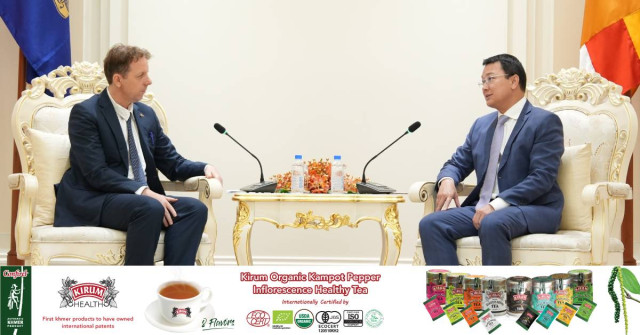Using E-Books? Some Students Still Prefer the Printed Ones

- By Tob Vannara
- March 10, 2024 4:09 PM
PHNOM PENH — In spite of being easily accessible and making it possible to have scores on hand without being burdened by their weight or needing a place to keep them, some Cambodian students still like to use printed works rather than reading them as e-books.
As they explained, an e-book can make it more difficult for a reader to concentrate than when using a physical book. E-books can also be a strain on the eyes when having to focus on a screen for long periods of time.
Sok Sovann, a second-year student at the Royal University of Phnom Penh (RUFA), said that he is among those who prefer books printed on paper rather than e-books, although e-books are convenient and may give access to up-to-date versions when needed. Reading a paper book helps him concentrate and understand content better than e-books, he said.
With an actual book, one does not get distracted by messages appearing or ringtones as happens when reading e-books on phones or computers, said Sovann who is majoring in geography.
In addition, browsing through physical books often is an opportunity to look into fields other than one’s own. “When reading books, we gain a lot of knowledge in psychology, sociology, communication, diplomacy, and especially our own fields,” he said.
Hen Channath also prefers reading books printed on paper. As she explained, when holding a book printed on paper, she can more easily concentrate and is not affected by eye strain as when reading an e-book. Still, she might turn to e-books when traveling because actual books can be heavy and cumbersome to carry, she said.
Channath is studying linguistics at RUFA. “This major…requires me to do a lot of research,” she said. “But I also read…motivating stories because I want to read books to inspire myself and help me develop abilities and positive thinking.”
Ham Sang Hav, a third-year student in economics at the Royal University of Phnom Penh, said that reading books on paper or on a screen will benefit readers in terms of knowledge if they focus on what they read.
Sang Hav, who is from Banteay Meanchey province, has had a passion for reading since he was a child, he said. Reading helps people understand the world around them, be more open and flexible, and handle and solve problems quicker, he said. Sang Hav added that he plans to keep on reading and hopes to conduct research in economics in the future.
Originally written in Khmer for ThmeyThmey, this story was translated by Chhuon Kongieng for Cambodianess.















